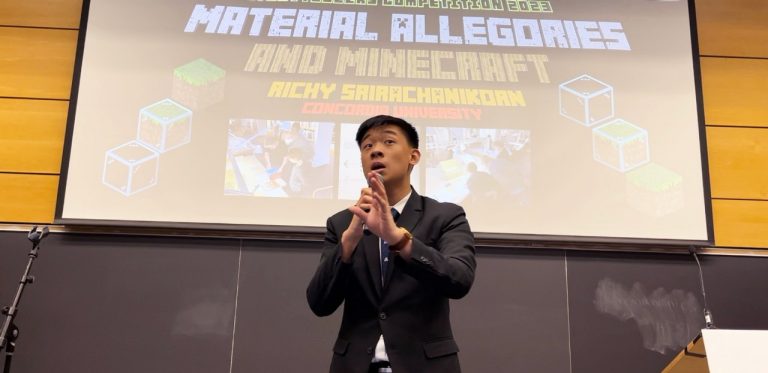Concordian Richy Srirachanikorn is a 2023 winner of the SSHRC Storytellers Challenge

Concordia graduate student Richy Srirachanikorn is one of the Final Five winners of this year’s Social Sciences and Humanities Research Council (SSHRC) Storytellers Challenge.
The annual contest calls for postsecondary students nationwide to demonstrate — in a three-minute or 300-word presentation — how SSHRC-funded research impacts Canadian society.
Srirachanikorn, a PhD student in the Department of Sociology and Anthropology, is among the four Concordia students who placed among the top 25 finalists in this year’s competition.
The others were Clarissa Belleville, BA 21, a master’s student in the Department of Education, Felicity Hamer, BFA 12, MA 15, a PhD student in the Department of Communication Studies, and Étienne Lacelle, BFA 17, a master’s student at the Mel Hoppenheim School of Cinema.
Each semi-finalist won $3,000, plus the chance to present before a distinguished jury to be named one of the five winners, which carries an additional $1,000 prize.
Srirachanikorn, who is also a student member of Concordia’s Milieux Institute for Arts, Culture and Technology, was selected as one of the final five winners at the Congress of the Humanities and Social Sciences at York University in Toronto on May 29.
“By taking part in the Storytellers Challenge, I learned research is ultimately about the translation of knowledge,” Srirachanikorn says. “The potential of research is not in how different it is from other work, but how we can convey it in a way that makes a difference.”
In his video submission, Srirachanikorn explores how the popular video game Minecraft can be applied to real life to understand social phenomena.
In Minecraft, players create structures using blocks. However, as Concordia’s Bart Simon, associate professor of sociology and anthropology, and Darren Wershler, associate professor of English, argue, the game is not just about blocks themselves but about the concept of blocks.
“When applied to real life, we use ideas from the stereotypes, tropes and concepts that we’ve been taught and seen elsewhere to form the building blocks of our realities. These are what we call allegories,” Srirachanikorn says.
He explains, for example, how someone might build a castle in Minecraft to symbolize progress, but in the process they have deforested the entire land and blocked a river path. This reveals the ideological building blocks that helped make those decisions.
“There is more to research than just the academic convention,” Srirachanikorn says.
“The works of the 24 other finalists do not only demand innovative responses to pressing issues — they are innovations in their own right. Self-narrated videos, touching poems and sound-guided meditations represented the projects that were SSHRC-funded while also being novel projects on their own,” he adds.
“This kind of knowledge-sharing generated new modes of understanding.”
Find out more about the SSHRC Storytellers contest as well as Concordia’s School of Graduate Studies.




